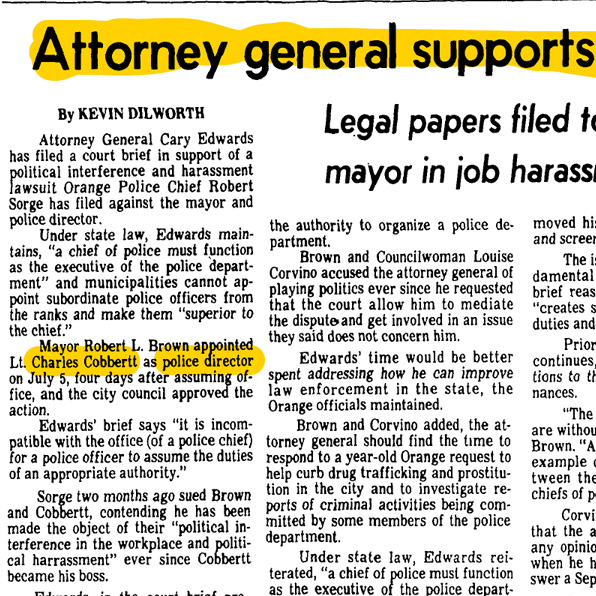Attorney General supports Orange... | November 13th, 1988 | Charles Cobbertt
Attorney General Cary Edwards has filed a court brief in support of a political interference and harassment lawsuit Orange Police Chief Robert Sorge has filed against the mayor and police director.
Under state law, Edwards maintains, "a chief of police must fuction as the executive of the police department" and municipalities cannot appoint subordinate police officers from the ranks and make them "superior to the chief."

Mayor Robert L. Brown appointed Lt. Charles Cobbertt as police director on July 5, four days after assuming office, and the city council approved the action.
Edwards' brief says "it is incompatible with the office (of a police chief) for a police officer to assume the duties of an appropriate authority."
Sorge two months ago sued Brown and Cobbertt, contending he has been made the object of their "political interference in the workplace and political harrassment" ever since Cobbertt became his boss.
Edwards, in the court brief prepared by Carl A. Wyhopen, a deputy attorney general, said his "interest in this litigation lies in the statewide significance of some issues which have been raised regarding the appropriate interpretation of the (state) statute which controls the organization of every municipal police department in the state."
The brief, submitted to Superior Court Judge Paul B. Thompson in Newark, notes the stage now is set to formally debate how municipalities derive the authority to organize a police department.
Brown and Councilwoman Louise Corvino accused the attorney general of playing politics ever since he requested that the court allow him to mediate the dispute and get involved in an issue they said does not concern him.
Edwards' time would be better spent addressing how he can improve law enforcement in the state, the Orange officials maintained.
Brown and Corvino added, the attorney general should find the time to respond to a year-old Orange request to help curb drug trafficking and prostitution in the city and to investigate reports of criminal activities being committed by some members of the police department.
Under state law, Edwards reiterated, "a chief of police must function as the executive of the police department. Unlike under the (1981) predecessor to this statute, there can be no administrative officer, superior to the chief, who is responsible for the operation of the police department."
Under the Brown administration, Sorge's lawsuit says, Brown and Cobbertt have sought to reduce Sorge's salary, assigned police officers to the detective bureau, appointed an acting chief when he was on vacation, forced him to wear a uniform while on duty, moved his office, fired his secretary and screened his mail.
The issues raised by Sorge are fundamental to the 1981 law, Edwards' brief reasons, because that legislation "creates statutory offices with defined duties and responsibilities."
Prior to the amendment, the brief continues, state law left police functions to the control of municipal ordinances.
"The attorney general's comments are without any substance," maintained Brown. "Also, this (brief) is just a prime example of a political alignment between the attorney general and the chiefs of police" throughout the state.
Corvino said, "I'm very surprised that the attorney general would give any opinion in support of Chief Sorge when he has not even bothered to answer a Sept. 15, 1987, letter I sent him.
"That unanswered letter outlined how Chief Sorge allowed vindictiveness and cronyism to exist in a department plagued by poor manpower deployment, low morale and accusations of some officers involved in questionable activities," Corvino said, "and in a city where little was done to stem the rising tide of criminal activities."
Corvino said some of the concerns she asked Edwards to look into 14 months ago "have come to pass, including the fact that some Orange police officers have been convicted of drug use, extortion and possessing stolen credit cards."
John R. Hagerty, a spokesman for the Attorney General's Office, said Corvino's 1987 letter does not have anything to do with Edwards filing a friend-of-the-court brief in support of Sorge.
Brown disagreed. He maintained that Edwards' stance, if upheld, would usurp his appointing authority rights and those of all mayors. This kind of action should be remembered and frowned upon by all mayors."
Edwards' interpretation of the law, said one law enforcement official who asked not to be identified, could, if upheld in Superior Court, jeopardize the jobs of police directors in Orange and municipalities such as Camden, Elizabeth, Irvington, Newark, Jersey City and Paterson.
The attorney general's thoughts on the matter, the official added, also could "establish and perpetuate a monarchy and dynasty" among police chiefs and make them answerable to no one.
Said Mayor Brown, "I'm certain that the Office of the Attorney General has a great many responsibilities beyond supervising the Orange Police Department. That's my job, and I accept it willingly and gladly. I'm not the least bit interested in running his office. I wish he felt the same way."
On Sept. 20, Judge Thompson imposed restraints upon Orange, blocking Brown and Cobbertt from interfering with Sorge's supervision of the 85-member police department's day-to-day operations while the litigation continues.


Comments
Post a Comment